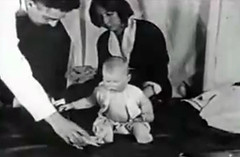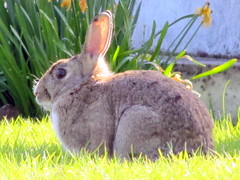AP Psychology Learning Flashcards
Terms : Hide Images [1]
| 5528668395 | Learning | Relatively permanent change in an organisms behavior due to experience |  | 0 |
| 5528668396 | Associative Learning | Defined: learning by putting together two events Example: Expect to hear thunder after viewing lightening |  | 1 |
| 5528668398 | Pavlov, Ivan | Contribution: developed the theory of "classical conditioning" while working with dogs Significance: Father of Classical Conditioning |  | 2 |
| 5528668399 | Watson, John B | Contribution: applies Classical Conditioning to Humans through the "Little Albert" Experiment Significance: Creates "Behaviorism" Theory, shows emotional responses can be conditioned, demonstrates generalization. |  | 3 |
| 5528668401 | Skinner, B.F. | Contributions: Invented the Operant chamber, aka his box, to use in his research of animal learning. Significance: Father & Developer of Operant Conditioning |  | 4 |
| 5528668402 | Bandura, Albert | Contribution: Studied how children mimic others behaviors and repeat that same behavior Significance: Creates "Observational Learning" Theory, Bobo Doll experiment |  | 5 |
| 5528668403 | Thorndike, Edward | Contribution: studied cats in puzzle boxes and recorded their behaviors Significance: Creates "Law of Effect" theory |  | 6 |
| 5528668404 | Garcia, John | Contribution: Demonstrated the significance of biological processes in classical conditioning Significance: Creates "Taste Aversions" theory |  | 7 |
| 5528668405 | Seligman, Martin | Contribution: Used dogs to demonstrates the significance of cognitive processes in classical conditioning Significance: Creates "Learned Helplessness" theory |  | 8 |
| 5528668406 | Tolman, Edward | Contribution: demonstrated the significance of cognitive processes in operant conditioning by studying rats in mazes Significance: Creates the "Latent Learning" theory |  | 9 |
| 5528668407 | Pavlov's Dogs | First experiment that created and demonstrate the theory of classical conditioning |  | 10 |
| 5528668408 | Little Albert | First experiment to demonstrate how emotions can be classically conditioned in humans Provides a foundation for the "Behaviorism Theory" |  | 11 |
| 5528668409 | Classical Conditioning | Learning that takes place when two or more stimuli are paired together to produce unavoidable physical reactions. UCS = UCR; NS + UCS = UCR; & CS = CR |  | 12 |
| 5528668410 | Behaviorism | Psychologist: John B. Watson Defined: a theory that made psychology an objective science by making it based on observable (and only observable) events, not the unconscious or conscious mind. |  | 13 |
| 5528668411 | Unconditioned Stimulus | Part of Classical Conditioning It is the stimulus that triggers a natural reflexive response. Pavlov's Dogs: "Meat" Little Albert: "Loud noise" |  | 14 |
| 5528668412 | Unconditioned Response | Part of Classical Conditioning It is the unlearned, naturally occurring response to the stimulus Pavlov's Dogs: It was the "Salivating to the Meat" Little Albert: "Screaming at the Loud Noise" |  | 15 |
| 5528668413 | Conditioned Stimulus | Part of Classical Conditioning It initially has no effect but after conditioning, it triggers a natural reflexive response. Pavlov's Dogs: It was the "Bell" Little Albert: "White Mouse" |  | 16 |
| 5528668414 | Conditioned Response | Part of Classical Conditioning Occurs after conditioning when the conditioned stimulus (CS) triggers an innate response Pavlov's Dogs: It was the "Salivating to the Bell" Little Albert: "Screaming/Crying" because of the white rat |  | 17 |
| 5528668415 | Neutral Stimulus | does not caused an unconditioned response but eventually becomes the Conditioned Stimulus |  | 18 |
| 5528668417 | Extinction | Classical Conditioning: The disappearance of a behavior because CS no longer paired with the UCS. (I go for years never being bit again by a chihuahua and I find I no longer panic when I am near one) Operant Conditioning: The disappearance of a behavior because it is no longer reinforced or punished |  | 19 |
| 5528668418 | Spontaneous Recovery | Classical Conditioning: When a previous conditioned response returns after it has been extinguished. (After years of being ok near dogs, suddenly you begin to panic once more.) Operant Conditioning: Occurs when a response begins again after extinction. | 20 | |
| 5528668419 | Stimulus Generalization | Classical Conditioning: When the conditioned response spreads and is prompted by stimuli similar to the conditioned stimulus. (Example: Little Albert being afraid of anything that is white and furry) Operant Conditioning: When a reinforced/punished behavior occurs in a setting/situation where it was NOT learned (Example: Operantly Conditioned to not curse at home so you also don't curse at school) |  | 21 |
| 5528668420 | Stimulus Discrimination | Classical Conditioning: the conditioned response is only prompted by the conditioned stimulus. (Example: I am only afraid of chihuahuas because I was bit by one. I am not afraid of labs or retrievers or Morkies.) Operant Conditioning: When a reinforced/punished behavior occurs in a setting/situation where it was learned (Example: Cursing only at home because it is acceptable there but not at school where it isn't acceptable) |  | 22 |
| 5528668422 | Taste Aversions | Psychologist: Garcia Defined: If you ingest an unusual food or drink and then become nauseous, you will probably develop an aversion to the food or drink. (Me and Hibachi) Significance: Violates the acquisition principles of classical conditioning because it only takes one pairing. |  | 23 |
| 5528668423 | Learned Helplessness | Defined: Exposure to inescapable and uncontrollable aversive (bad) events produces passive behavior Study: Seligman delivering shocks to dogs Example: If a student consistently fails math, they may start to give up or a sports team that consistently loses may start to believe they can't win |  | 24 |
| 5528668425 | Biological Preparedness | Defined: humans and animals have predisposed fears that help us survive Examples; Phobia of heights keeps us away from danger |  | 25 |
| 5528668426 | Operant conditioning | Defined: Learning is based on the association of one's behavior and its consequences. Consequences are reinforced or punished Example: You choose to break curfew based on the consequences |  | 26 |
| 5528668427 | Law of Effect | Psychologist: Edward Thorndike Defined: if a behavior results in a satisfying consequence, it will likely be repeated whereas; if a behavior results in a unsatisfying consequence, it will NOT likely be repeated Example: If you complement your mother and she lets you stay out past curfew, you will complement her again |  | 27 |
| 5528668428 | Skinner Box | Description: A chamber containing a bar or key that an animal (rat or pigeon) can manipulate in order to obtain a reward |  | 28 |
| 5528668429 | Positive Reinforcement | Part of Operant Conditioning Adding something to increase the likelihood of a behavior occurring again Example: Receiving $5 for every "A" in high school |  | 29 |
| 5528668430 | Negative Reinforcement | Part of Operant Conditioning Increasing the likelihood of a behavior occurring again by removing a negative stimuli Example: Taking aspirin to relieve a headache |  | 30 |
| 5528668431 | Primary Reinforcers | Reinforcers that are rewarding such as food, water, rest, whose natural properties are reinforcing. |  | 31 |
| 5528668432 | Secondary Reinforcers | Defined: Reinforcers that are rewarding because we learned that they are reinforcing. Example: praise, money, the chance to play video games. |  | 32 |
| 5528668435 | Punishment by Application/Positive Punishment | Part of Operant Conditioning Adding something to decrease the likelihood of a behavior occurring again Example: Spanking and yelling |  | 33 |
| 5528668436 | Punishment by Removal/Negative Punishment | Part of Operant Conditioning Removing something to decrease the likelihood of a behavior occurring again Example: No phone for a week |  | 34 |
| 5528668438 | Shaping | Part of Operant Conditioning Positively reinforcing closer and closer approximations of a desired behavior to teach a new behavior |  | 35 |
| 5528668440 | Superstitious Behavior | Defined: if a random reinforcement follows an event, the event will likely be repeated. Example: a lucky shirt, shoes, etc. |  | 36 |
| 5528668441 | Continuous Reinforcement Schedule | Defined: When every behavior is reinforced Example: every single time a child pees on the toilet, they get an M&M` Significance: quickly learned, but quickly lost. |  | 37 |
| 5528668442 | Partial Reinforcement Schedule | Defined: When a random behavior is reinforced Example: Fixed Ratio, Variable Ratio, Fixed Interval, Variable Interval Significance: best for "maintaining" a behavior |  | 38 |
| 5528668443 | Fixed-Ratio Schedule | Defined: reinforcement occurs after a set number of responses. Example: Being paid for every 10 pizzas made |  | 39 |
| 5528668444 | Variable-Ratio Schedule | Defined: schedule of reinforcement after a varying number of responses. Example: playing a slot machine- how many pulls before I hit it rich varies |  | 40 |
| 5528668445 | Fixed-Interval Schedule | Defined: schedule of reinforcement after a fixed amount of time has passed Example: being paid every two weeks |  | 41 |
| 5528668446 | Variable-Interval Schedule | Defined: schedule of reinforcement after varying amounts of time Example: pop (surprise) quizzes in class |  | 42 |
| 5528668447 | Latent Learning | Defined: Learning that occurs but is not apparent until there is an incentive to demonstrate it Example: Tolman's rats had learned the maze by wandering around, but only demonstrated it when he gave them cheese. |  | 43 |
| 5528668448 | Cognitive Maps | Defined: having the ability or know how to accomplish a particular task Example: Tolman's rats knew how to complete the maze |  | 44 |
| 5528668450 | Insight Learning | Defined: suddenly knowing the solution to the problem Example: When taking a test and the previous answer comes to you without effort, an "aha" moment |  | 45 |
| 5528668453 | Observational Learning | Defined: learn by watching others Example: BoBo Doll Study |  | 46 |
| 5528668454 | BoBo Doll Study | Psychologist: Bandura Description: Children watched (through a one way glass)a confederate play with the BoBo doll and then played with the BoBo doll in the same way as the confederate Significance: used to develop "observational learning" |  | 47 |
| 5528668455 | Mirror Neurons | Defined: frontal lobe neurons that fire when performing certain actions or when observing another doing so Example: explains why yawning is contagious |  | 48 |
